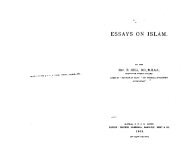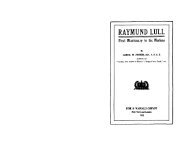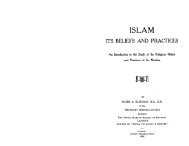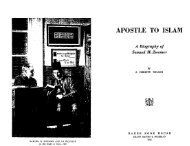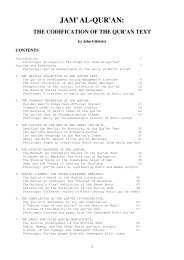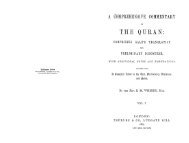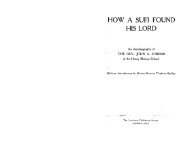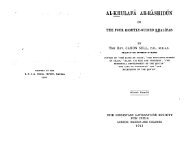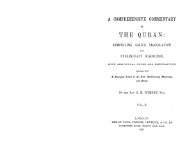Guillaume--Life of Muhammad.pdf - Radical Truth
Guillaume--Life of Muhammad.pdf - Radical Truth
Guillaume--Life of Muhammad.pdf - Radical Truth
You also want an ePaper? Increase the reach of your titles
YUMPU automatically turns print PDFs into web optimized ePapers that Google loves.
xxiv The <strong>Life</strong> <strong>of</strong> <strong>Muhammad</strong> Introduction xxv<br />
in heaven at Sa'd's arrival; others claimed that the angelic bearers <strong>of</strong> the<br />
throne were meant. But Suhayli will have none <strong>of</strong> this. The throne is a<br />
created object and so it can move. Therefore none has the right to depart<br />
from the plain meaning <strong>of</strong> the words. Moreover, the tradition is authentic<br />
while traditions like that <strong>of</strong> ai-Barra' to the effect that it was Sad's bed<br />
that shook are rightly ignored by the learned. He goes on to point out that<br />
al-Bukhari accepted the tradition not only on the authority <strong>of</strong> Jabir but<br />
also on the report <strong>of</strong> a number <strong>of</strong> other companions <strong>of</strong> the prophet-a<br />
further indication <strong>of</strong> the snowball growth <strong>of</strong> the legend. S. finds it most<br />
surprising that Malik rejected the hadith and he adds naively from the<br />
point <strong>of</strong> view <strong>of</strong> later generations that Malik would not have it mentioned<br />
despite the soundness <strong>of</strong> its transmission and the multitude <strong>of</strong> narrators,<br />
and he adds that it may be that Malik did not regard the tradition as sound!<br />
The passage is instructive in that it shows how far 1.1. could go in the<br />
face <strong>of</strong> one <strong>of</strong> the most learned <strong>of</strong> his contemporaries in Medina. Posterity<br />
has sided with 1.1. on this matter, but Malik clearly had many on his side<br />
at the time, men who would not take at its face value a story which they<br />
could not reject out <strong>of</strong> hand, as he did, with the weight <strong>of</strong> contemporary<br />
opinion behind it.<br />
Another feature that stands out clearly from time to time is the insertion<br />
<strong>of</strong> popular stories on the Goldilocks model. For the sake <strong>of</strong> the reader<br />
I have rendered these storie$ in accord with modern usage, as the repetition<br />
<strong>of</strong> the same words and the same answer again and again is intolerable -to<br />
the modern adult. Such stories are the stock-in-trade <strong>of</strong> the Arabian<br />
q~f and the storyteller all the world over and invariably lead up to the<br />
climax which it is the speaker's intention to withhold until he has his<br />
audience on tiptoe. A good example <strong>of</strong> such stories is the nar~ative <strong>of</strong><br />
<strong>Muhammad</strong>'s arrival in Medina and the invitation <strong>of</strong>one clan after another,<br />
always declined with the same words.'<br />
After giving due weight to the pressure <strong>of</strong> hagiology on the writer and his<br />
leaning towards the Shi'a one must, I think, affirm that the life <strong>of</strong> <strong>Muhammad</strong><br />
is recorded with honesty and truthfulness and, too, an impartiality<br />
which is rare in such writings. Who can read the story <strong>of</strong> al-Zabir,2 who<br />
was given his life, family, and belongings but did not want to live when the<br />
best men <strong>of</strong> his people had been slain, without admitting that here we have<br />
a true account <strong>of</strong> what actually happened1 Similarly who but an impartial<br />
historian would have included verses in which the noble generous character<br />
<strong>of</strong> the Jews <strong>of</strong> the Hijaz was lauded and lamented? The scepticism <strong>of</strong><br />
earlier writers seems to me excessive and unjustified. We have only to<br />
compare later Lives <strong>of</strong> <strong>Muhammad</strong> to see the difference between the<br />
historical and the ideal <strong>Muhammad</strong>.'<br />
I 335 f. :& p. 691. .<br />
3 N61deke, Islam, v, 1914, has drawn attention to many incidents lind characteristiCS <strong>of</strong><br />
the Sira which could not have been invented and which show intimate knowledge <strong>of</strong> the<br />
facts.<br />
The Poetry<br />
Doubts and misgivings about the authenticity <strong>of</strong> the poems in the Sira<br />
are expressed so <strong>of</strong>ten by 1.H. that no reference to them need be given<br />
here. Nevertheless, one should be on one's guard against the tendency to<br />
condemn all the poetry out <strong>of</strong> hand. What 1.H. says about the poetry <strong>of</strong><br />
those who took part in the battle <strong>of</strong> Badr, whether or not it includes the<br />
verses <strong>of</strong> Hassan b. Thabit, namely 'These verses (<strong>of</strong> Abu Usama) are the<br />
most authentic <strong>of</strong> those (attributed to) the men <strong>of</strong> Badr' (p. 534), casts<br />
grave doubt on the authenticity <strong>of</strong> a large section <strong>of</strong> the poetry <strong>of</strong> the<br />
Sira. Nevertheless 1.1. is not to be blamed for the inclusion <strong>of</strong> much that<br />
is undoubtedly spurious without a thorough investigation which has not<br />
yet been undertaken. The poems he cites on pp. 284 and 728 he got from<br />
'Asim b. Qatada, while those on pp. 590, 789, and 793 come from 'Abdullah<br />
b. Abu Bakr.' We know, too, that Musa b. 'Uqba cited verses.'<br />
An early critic <strong>of</strong> poetry, al-JumaJ:>P (d. 23')' though perhaps rather<br />
one-sided and ill balanced in his judgement on 1.1., makes some observations<br />
which cannot fail to carry conviction. He says: '<strong>Muhammad</strong> b.<br />
IsJ:>aq was one <strong>of</strong> those who did harm to poetry and corrupted it and passed<br />
on all sorts <strong>of</strong> rubbish. He was one <strong>of</strong> those learned in the biography <strong>of</strong>the<br />
prophet and people quoted poems on his authority. He used to excuse<br />
himself by saying that he knew nothing about poetry and that he merely<br />
passed on what was communicated to him. But that was no excuse, for he<br />
wrote down in the Sira poems ascribed to men who had never uttered a<br />
line <strong>of</strong> verse and <strong>of</strong> women too. He ,even went to the length <strong>of</strong> including<br />
poems <strong>of</strong> 'Ad and Thamud! Could he not have asked himself who had<br />
handed on these verses for thousands <strong>of</strong> years when God said: "He<br />
destroyed the first 'Ad and Thamud and left none remaining'" while <strong>of</strong><br />
'Ad he said "Can you see anything remaining <strong>of</strong> them I'" and "Only God<br />
knows 'Ad and 'l'hamud and those who came after them."'6 Some <strong>of</strong> these<br />
poems are quoted by T. 7<br />
1. al-Nadim' goes farther by suggesting that 1.1. was party to the fraud:<br />
the verses were composed for him, and when he was asked to include them<br />
in his book he did so and brought himself into ill repute with the rhapsodists.<br />
Occasionally 1.1. says who the authority for the poetry was.'<br />
Obviously at this date critIcism <strong>of</strong> the poetry <strong>of</strong> the Sira can be based<br />
only on historical and perhaps in a lesser degree on literary and stylistic<br />
grounds. Some <strong>of</strong> the poetry dealing with raids and skirmishes, tribal<br />
boasting, and elegies seems to come from contemporary sources, and no<br />
reasonabie person would deny that poetic contests between Meccan and<br />
Medinan poets really took place: everything we know <strong>of</strong> ancient Arab<br />
1 Also pp. 950-1. Cf. the corresponding passages in T. 1732, 173S.<br />
a Cf. I.S. iii. 241.<br />
, Tahaqat aI-Shz/ara', ed. J. Hell, Leiden, 1916, p. 4·<br />
.. S6ra 53. 51. ! Sura 69. 8. 6 Sura 14· 9.<br />
'1 Horovitz, op. cit., cites i. 236, 237, 241, 242.<br />
• AI~Fihrilt, Cairo, '136.



